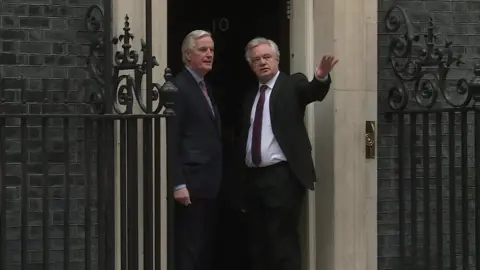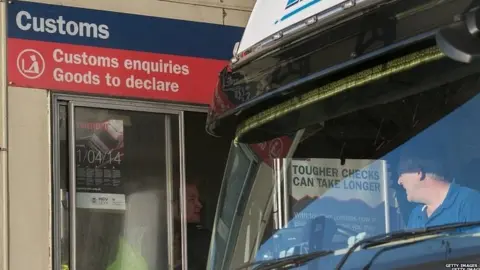Trade barriers 'unavoidable' outside customs union, says EU's Barnier
The UK will face "unavoidable" barriers to trade if it leaves the customs union and single market, the EU's chief negotiator Michel Barnier has said.
Speaking in Downing Street, he said the "time had come" for the UK to choose what it wanted after its 2019 exit.
Brexit Secretary David Davis said the UK's position was "perfectly clear".
The UK, he argued, wanted a free trade deal with the EU but also the freedom to strike deals with other countries, where trade opportunities were growing.
"There's no doubt about it. We are leaving the customs union but we are aiming for a good future for Britain," Mr Davis said.
He also said he was confident the two sides would reach an agreement on a "transitional" or "implementation" phase - to last between 18 months and two years after the UK leaves next year - in time for an EU summit at the end of March.
After lunch with Mr Davis and a 20-minute meeting with Theresa May, Mr Barnier said there was "some divergence" between the two sides when it came to issues relating to transition and how the exit deal would be enforced.
While he said he respected the UK's decision to rule out any form of long-term customs union and other so-called "red lines", he said it was a prerequisite of any deal that "everyone plays by the same rules" during the transition period - where the UK would have to comply with existing EU laws and regulations.
He said he wanted greater clarity from the UK about what ultimate partnership it wanted with the EU after its departure, expressing his hope an "official position" would be put forward soon.
Allow X content?
"The only thing I can say, without a customs union and outside the single market, barriers to trade in goods and services are unavoidable. The time has come to make a choice."
The government's 11-strong Brexit cabinet sub-committee will meet on Wednesday and Thursday as UK officials prepare to brief their EU counterparts on their vision for post-Brexit relations on Friday.
At the same time, there will be initial discussions on the "transitional" period as well as efforts to convert the details of December's agreement on the Irish border, citizens' rights and money into a legal framework.
Ahead of this, Downing Street ruled out any form of customs union with the EU, which would give the UK access to tariff-free trade within the bloc but mean it cannot negotiate its own deals with other countries.
Allow X content?
Downing Street said the government had set out two potential alternatives last summer - a new customs partnership without the need for any customs checks and a "highly streamlined" arrangement in which EU arrivals would be subject to customs checks but in a way that minimised disruption through technology.
No 10 would not say which was the preferred option and said work was continuing on both proposals.
Conservative MEP Daniel Hannan said Switzerland was an example of a country which had both its own customs arrangements with the EU and an independent trade policy.

"Britain is a global country, a world trader," he told the BBC's Daily Politics, adding that the UK had been "artificially penalised" by the customs unions because it trades more outside the EU than inside.
But former attorney general Dominic Grieve said he found Downing Street's intervention "rather strange" since the UK would have to maintain some form of "customs union or alignment" with the EU if it was to honour the terms of its agreement to prevent any hard border on the island of Ireland.
 Getty Images
Getty ImagesLabour said it was "foolhardy" to rule out any kind of customs union with the UK's largest trading partner.
"The government must put jobs and the economy first, not their own internal party wrangling," a party spokesman said.
Immigration 'shambles'
In the House of Commons, ministers faced criticism for delays in putting forward new post-Brexit immigration rules.
The government has said new border controls will be brought in when EU free movement rules no longer apply, but a promised White Paper policy document has yet to be published.
Businesses groups have expressed frustration at the wait for concrete proposals.
And in an urgent Commons question, Labour MP Yvette Cooper, who chairs the Home Affairs Select Committee, said it was a "shambles" and accused the government of "kicking the can down the road".
Immigration Minister Caroline Nokes denied this, saying it was "imperative" that the White Paper and an immigration bill were the "right pieces of legislation" when they were brought to the Commons.
"We will publish a White Paper in the coming months, when the time is right," she said.
